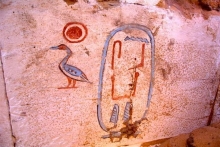Josef Wegner and Team Unearth Forgotten Egyptian Pharaoh

A team of Penn archaeologists led by Josef Wegner, Associate Professor in the Department of Near Eastern Languages and Civilizations and Associate Curator in the Penn Museum’s Egyptian Section, has found the tomb of an unknown king in the city of Abydos. After excavating a series of chambers constructed of mud-brick—usually a sign of a common person’s tomb—they encountered a burial chamber lined with limestone.
“Coming down from the top of that chamber, we could see that there were these beautiful images painted on the walls—scenes and texts,” says Wegner. “There was a moment when we removed a little bit of sand and we suddenly saw the name of a king. We were like, ‘Holy smokes, what is going on here?’”
The pharaoh, named Senebkay, was previously unknown to historians. Based on clues that Wegner and his team have pieced together, the king ruled over a forgotten Abydos dynasty around 1650 B.C.E. Their discovery, together with an ancient cataloging of Egyptian rulers called the Turin King List, suggests that Senebkay was the first or second of a series of approximately 20 as-yet-undiscovered pharaohs that ruled over a small kingdom.
The standard understanding of the period was that dynasties from the north and south were divided and at war with one another off and on. Finding evidence of a third kingdom—the Abydos dynasty—alters the political picture of the time.
The archaeologists also discovered a connection between the newly uncovered tomb and an adjacent sarcophagus they uncovered last summer, which belonged to a different king named Sobekhotep: a chest made of cedar wood that contained Senebkay’s organs. The box had been gilded, but ancient tomb robbers had removed the gold, uncovering an inscription of a king’s name. But the name was Sobekhotep’s, not Senebkay’s, showing that objects from Sobekhotep’s tomb had been repurposed for Senebkay.
Penn graduate students Kevin Cahail, Matt Olson, and Paul Verhelst also played key roles on the excavating team.
Read the full story here.





